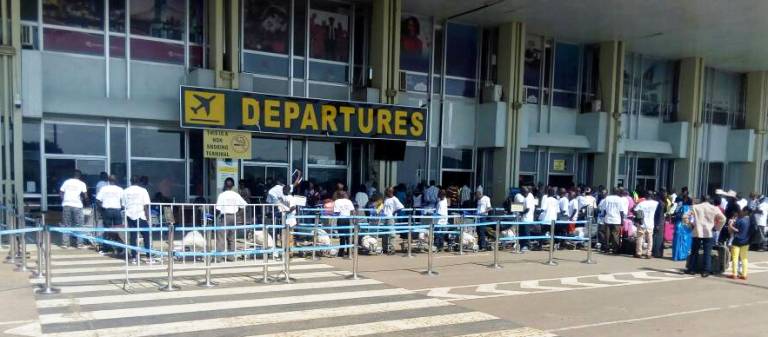U.S Ambassador William Popp (middle) with the Consular Section Chief, Tania J. Romanoff, and the Supervisory Special Agent, Brian Jolda.
United States visas for Ugandan citizens will be valid for only three months following changes by the Department of State to nonimmigrant visa validity for nationals of certain countries.
The U.S. Ambassador to Uganda, William Popp, on Monday told journalists at the American Centre that this is part of the commitment to protect the United States and its citizens by upholding the highest standards of national security and public safety through the visa process.
“The overarching effort to achieve this goal has been laid out in President Trump’s Executive Order (E.O.) 14161 issued on 20th January 2025, entitled ‘Protecting the United States from Foreign Terrorists and Other National Security and Public Safety Threats. In issuing the order, the visa adjudication process has been a key component, and this must ensure that U.S.–bound foreign travellers do not pose a threat to the national security and public safety of the United States,” said Ambassador Popp.
He explained that President Trump directed the Secretary of State to evaluate all visa programs to ensure that they are not used by any foreign national state or other hostile actor to harm the security, economic, political, cultural, or other national interests of the United States.
To that end, Ambassador Popp stated that to protect the United States’ national security and interests, the Department of State and other U.S. government agencies assessed other countries’ security capabilities; information-sharing, identity management practices, and any exploitation of the U.S. visa system, such as fraud, overstays, and failure to facilitate the repatriation of removable nationals.
“In furtherance of the executive order, the Department of State changed non-immigrant visa validity for nationals of various countries, including Uganda. New nonimmigrant visas for Ugandan citizens will now be issued as valid for one entry, three months, which mirrors the validity that Ugandan visas issued to American tourists and business travellers have been,” Ambassador Popp stated.
He emphasised that this validity change is one way of increasing the United States’ ability to detect and prevent abuse of the country’s immigration system.
Ambassador Popp noted that the changes have taken immediate effect but will not affect visas issued in the past. Before the new restrictions, Ugandans would receive nonimmigrant visas of up to two years.
According to the Department of Homeland Security Entry/Exit Overstay Report, regarding visitors whose authorized period of admission expired between October 1, 2022 and September 30, 2023, Uganda’s B1/B2 (business/tourist) visa overstay rate is 8.42%, and Uganda’s F, M, J (students and exchange visitors) visa overstay rate is 16.71%.
Tania J. Romanoff, the U.S Embassy Consular Section Chief elaborated about the visa adjudication process, saying that national security is always their top priority when screening applicants and that individuals who intentionally provide inaccurate information during a visa application and interview do not receive a visa and may be permanently ineligible to obtain one, and potentially face prosecution in Uganda or the U.S.
The Consular Section Chief also explained that the change of the visa validity from two years to three months, will not have a change to the visa fees, since these are set globally based on the actual cost of the conducting face to face interviews, maintaining the website for applications, and actual printing of the visa.
In regard to birth tourism, Romanoff warned that using a U.S. visa to travel for the primary purpose of giving birth in the United States is not permitted and that consular officers will deny a visa application if they have a reason to believe that is the primary purpose of travel.
“We have seen that many Ugandan parents travel to the United States to give birth in the U.S., and then they use U.S. government assistance to pay for the child’s birth. These costs are then passed on to the American taxpayer,” she revealed.
When asked about the number of Ugandans who have in the past used their tourism visas to give birth in the United States, Romanoff indicated that they don’t currently have a number to speak to since they deal with cases of birth tourism on a one-off basis.
“There is no registry of every Ugandan who has given birth in the U.S. Unfortunately, I don’t have a number to share with you today. We don’t have the exact numbers on birth tourism. We don’t have a specific database for birth tourism, but they are lumped together with all the other refusals. We are not giving them a specific code, so there is no way for us to go back and see,” Romanoff explained.
Brian Jolda, the Supervisory Special Agent with the Diplomatic Security Service (DSS), also doubling as the in-charge of the Overseas Criminal Investigations at the U.S. Embassy, stated that providing fake documents during the visa process is a crime.
He revealed that in the past two weeks, they have assisted in the arrest of five visa applicants who presented fraudulent documents, including O-level, A-level certificates, university transcripts, and bank statements.
Jolda warned that those who commit fraud and abuse the visa application process face arrest and are to be held accountable.
-URN





